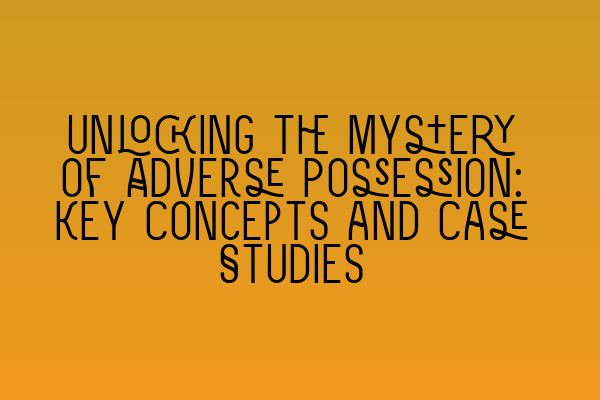Unlocking the Mystery of Adverse Possession: Key Concepts and Case Studies
Introduction:
Adverse possession is a concept that has intrigued property law enthusiasts for centuries. The idea of someone gaining ownership of a piece of land simply by occupying it for a certain period of time can seem like a legal enigma. However, it is a well-established principle in property law that serves to ensure the efficient use of land and protect the interests of those who have occupied and maintained it for an extended period. In this blog post, we will delve into the key concepts and case studies surrounding adverse possession, shedding light on this fascinating area of property law.
Understanding Adverse Possession:
Adverse possession occurs when someone who is not the legal owner of a property claims ownership by occupying it for a specified period. In general, the occupier must meet certain criteria to establish adverse possession. These criteria typically include open and continuous possession of the land for a minimum period, usually ranging from 10 to 12 years, without the permission or consent of the true owner. The occupier must also possess the land with the intention of claiming ownership.
Key Concepts:
To further comprehend the nuances of adverse possession, it is important to consider the key concepts associated with this area of law. These concepts include:
1. Hostile Intent: The occupier must possess the land without the permission or consent of the true owner. This hostile intent is essential in establishing adverse possession.
2. Actual Possession: Merely having paper title to a property is insufficient to assert a claim of adverse possession. The occupier must physically possess and control the land, demonstrating actual occupation.
3. Open and Notorious Possession: The possession must be visible and obvious to everyone, including the true owner. If the true owner is aware of the occupier’s possession and does nothing to challenge it, this strengthens the occupier’s claim.
4. Exclusive Possession: The occupier must possess the land exclusively, meaning that they have exclusive control and use of the property without interference from others.
5. Continuous Possession: The occupation must be continuous for the required period. Any interruption in possession may undermine the claim of adverse possession.
Case Studies:
To better understand how adverse possession operates in practice, let’s explore a couple of case studies that highlight its practical implications:
1. Smith v. Brown: In this case, Mr. Smith had been farming a small piece of land adjacent to his property for over 12 years, even though the legal owner was Mr. Brown. Mr. Brown was aware of Mr. Smith’s occupation but took no action. The court determined that Mr. Smith had met the criteria for adverse possession and granted him legal ownership of the land.
2. Johnson v. Thompson: Mr. Johnson had been using a portion of his neighbor’s land as a driveway for over 15 years. The legal owner, Mr. Thompson, was aware of this but did not raise any objections. The court held that Mr. Johnson had fulfilled the requirements for adverse possession and was deemed the rightful owner of the driveway.
Conclusion:
Adverse possession may be a mysterious concept at first glance, but it is a well-established principle in property law. Understanding the key concepts and case studies surrounding adverse possession is vital for anyone involved in property transactions or disputes. If you need further assistance or have any questions regarding adverse possession, feel free to contact SQE Property Law & Land Law, experts in this field. Also, don’t forget to check out our related articles:
– SQE 1 Practice Exam Questions
– SQE 1 Practice Mocks FLK1 FLK2
– SQE 2 Preparation Courses
– SQE 1 Preparation Courses
– SRA SQE Exam Dates
We are here to provide you with expert guidance and support in navigating the complexities of property law. Stay tuned for more informative articles on various aspects of property law, brought to you by SQE Property Law & Land Law.
